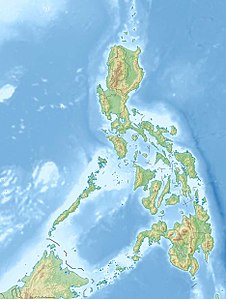Basilan
| Basilan | ||
|---|---|---|
| Map of Basilan | ||
| Waters | Pacific Ocean | |
| Archipelago | Sulu Archipelago | |
| Geographical location | 6 ° 35 ' N , 122 ° 2' E | |
|
|
||
| length | 66 km | |
| width | 44 km | |
| surface | 1 234.2 km² | |
| Highest elevation | 1020 m | |
| Residents | 259.796 210 inhabitants / km² |
|
| main place | Isabela City | |
Basilan (also Taguima ) is an island in the south of the Philippines and part of the Sulu Archipelago . Four fifths of it, together with other, smaller islands, form the Basilan province of the same name in the Autonomous Region in Muslim Mindanao , the rest of the island, i.e. Isabela City, is part of the Zamboanga Peninsula region .
The island is separated from Zamboanga City in Mindanao by the Strait of Basilan . Basilan is the northernmost of the main islands of the Sulu Archipelago .
geography
Basilan is one of 7,107 islands that make up the Philippine archipelago. From a regional perspective, Basilan is part of the Sulu Archipelago and is one of the 400 or so Philippine islands between Mindanao and Borneo .
The island is 66 km long and 44 km wide and has a total area of 1,234.2 km², on which 259,796 people live. The island is crossed by a mountain range from west to east, from which peaks up to 1,020 m high rise in the north-west and south.
The island is part of one of two chains of islands that form a partial land bridge to Borneo and are important entry routes for migratory birds. The Strait of Basilan separates Basilan Island from the main part of Mindanao and the port of Zamboanga City .
Administrative division
On the island of Basilan there are nine of the eleven independently administered municipalities in the province of Basilan and two cities .
Cities
Administrative communities
history
Four indigenous people live on Basilan, the Sama Dilaut ( Sama of the sea , some of them are still sea nomads ), the Sama Bangingi , the Yakan and the Tausugs .
The original inhabitants of Basilan were the Dampuans , they are considered to be the ancestors of the Yakan, which - going back to the Spaniards - are also called Sameacas. Tausugs and the Samal speaking tribes settled along the coast and brought Islam to the island; the Yakan, who originally lived there, were pushed back into the interior. In 1637 the Spaniards conquered the Lamitan area, but were expelled again in 1663. In 1747 the Dutch tried to take the island and in 1844 the French followed, but both were unsuccessful. Eventually the Spaniards established a fragile rule that they had to share with pirates .
In 1901 Basilan became part of the large province of Zamboanga. In the period that followed, an increasing number of speakers of one of the Chabacano and Visayan languages settled in Isabela to work on the rubber plantations . In 1973 Basilan became an independent province with the capital Isabela .
Basilan became known around the world as an important base for the terrorist Islamist group Abu Sajaf , founded in 1991 , when a group of tourists was abducted from Sipadan to Basilan in 2000 . Doctor Nilo Barandino, who himself was abducted in 1992, tries to solve other kidnappings.
economy
About 70 percent of the land area is used for agriculture. Mainly coconuts , rubber and coffee beans are harvested , along with maize , cocoa , pepper and palm oil are notable agricultural products from this island.
Nature reserves
- Basilan Natural Biotic Area , it contains up to 12 endemic bird species that are only found on the island of Basilan.
Web links
swell
- ↑ Help for sick hostages called for. In: Berliner Kurier . June 18, 2001, accessed August 14, 2015 .
- ↑ TAZ: The Doctor and the Quick Death



